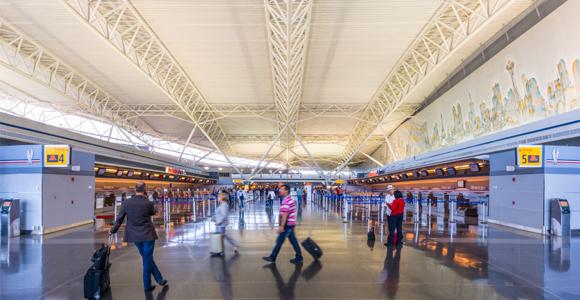5 Major US Airports to Enhance Ebola Screenings


In response to outcry over the first reported Ebola carrier falling ill in the US, federal officials have announced increased screening of passengers entering the country from West Africa. Some experts, however, question the effectiveness of the new measures.
The Department of Homeland Security (DHS) announced on Wednesday that enhanced screening will begin for all passengers entering the U.S. from Ebola-affected countries at five of the busiest airports. The increased screening will be undertaken by the Centers for Disease Control (CDC) and the Customs and Border Protection (CBP) agency at John F. Kennedy International Airport (JFK) beginning October 11. The measures will come to Washington Dulles International Airport (IAD), Newark Liberty International Airport (EWR), O’Hare International Airport (ORD) and Hartsfield-Jackson Atlanta International Airport (ATL) starting next week.
The DHS estimated that 94 percent of passengers from the Ebola-affected nations in Africa enter the U.S. through one of the five aforementioned airports.
The increased scrutiny measures for travelers entering the U.S. from Guinea, Liberia or Sierra Leone will include being escorted to an isolated area by CBP agents for screening and evaluation by medical personnel following passport review. During the screening process and medical evaluation, passengers will be provided with information on how to monitor themselves for Ebola symptoms and what to do if they become ill after leaving the airport.
The CDC is sending additional staff to the five airports. Passengers that show signs of infection will be evaluated by CDC officials and referred to local public health authorities if needed.
Some experts worry that the measures announced on Wednesday may actually hamper efforts to control the disease by taking away money and manpower from actual Ebola cases. Larry Gostin, a Georgetown University professor of global health law, told NPR’s Morning Edition that the time and money wasted as a result of a false positive in the screening process could come at the cost of more effective measures.
“Just the other day, at Newark airport, someone came in with vertigo,” Gostin told Morning Edition, claiming that officials spent several hours dealing with the case, which turned out to be a false alarm. “It’s kind of not what you want.”
Gostin cited similar screening efforts in Australia during the height of the SARS epidemic in 2003 as an example. Of the 794 passengers found to have a fever, none were infected with the virus. Gostin noted that in at least one case, flight attendants handed out Tylenol to passengers so they would be less likely to exhibit signs of infection.
Even as the DHS unveiled the new screening precautions, the agency admitted that “exit screening at airports in countries affected by Ebola remains the principal means of keeping travelers from spreading Ebola to other nations.”
CDC Director Tom Frieden lauded the new steps in the statement from the DHS, but indicated the best means of preventing Ebola from entering the U.S. would be to stop the outbreak at its source, stating, “We believe these new measures will further protect the health of Americans, understanding that nothing we can do will get us to absolute zero risk until we end the Ebola epidemic in West Africa.”
[Photo: iStock]





















